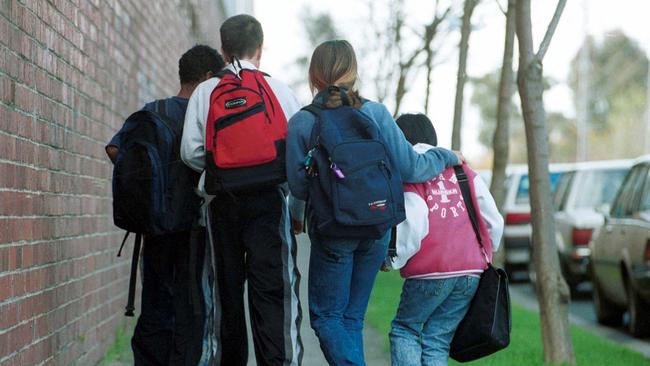Judith Locke: How to help your child transition to high school
Transitioning from primary to high school life can be seriously challenging for many children. But there are things you can do to help your child prepare, writes psychologist Dr Judith Locke.

Rendezview
Don't miss out on the headlines from Rendezview. Followed categories will be added to My News.
Last week I spoke about starting primary school.
This week I want to discuss children starting Year 7.
The process of starting high school is usually a little easier for children, because they’ve been at school for many years and, most times, they will feel pretty comfortable about it all. But that’s not to say there aren’t a few things you can do to help them become ready for the transition.
MORE FROM JUDITH LOCKE: Five family-friendly resolutions for the new year
High schools can be a bit more challenging than primary school life, because typically, they are much busier environments. Students leave primary school used to one main teacher and only being in one classroom. In high school, they have at least six subjects with different teachers and classrooms, so their attention is divided, and their responsibilities are far greater with fewer daily reminders of what to do.
That’s not a bad thing. They do need to learn how to prioritise and, let’s face it, adult life is all about managing competing demands. But it can be a difficult transition for your child – particularly if their last primary teacher was highly accommodating and somewhat spoonfeeding.

Make sure they become independent
The most important thing you do to prepare your child for high school is to develop their independence in primary school, particularly their academic independence. By the end of primary school, your child should be completely responsible for doing their homework and assignments with very few, if any, reminders from you.
If you have overhelped them, it is essential that you step back a bit now so that they step up. You can do a bit of that by making them a bit more responsible for things around the house now, such as preparing a few meals and learning how to do the washing. You might want to link their increased responsibilities with increased rights, say, being able to go to movies with their friends.
Make this a big announcement of a policy change, such as ‘You about to enter high school, I think you are responsible enough to sort out your own washing/breakfast and lunch /schoolwork without any reminders from me.’
You might police their schoolwork a little early in the year, but eventually you will leave it to them, confident that there is a benefit to sorting themselves out and a cost if they don’t.
To be thorough in teaching them independence, you also should not drop off forgotten items at high school. Ideally, if they don’t remember things, then they get the consequence – such as missing the swimming lesson or getting a uniform detention.

Have them familiarise themselves with the layout of the school
High schools are often huge places and they will need to know the lay of the land. Typically, schools have some sort of ‘getting to know the school’ element of their orientation day, the year before or on the first day. If your child is excessively worried about this, either take them up to the school again to get them familiar with it or encourage them to ask their current teacher where the next class is located.
Another good idea is to get them to tee up with someone in their class. They could say ‘Hey, do you want to stick together today and work out where things are?’ Most children will be happy to have that support. If there is the two of them, they might also be a little more confident to ask questions of other students, if they get lost.
MORE FROM JUDITH LOCKE: Family rules to help kick your child’s phone addiction
It’s understandable that you worry a bit about whether they will manage it all and want to step in to ensure they have it all sorted under your guidance. But the more you do this the less they will be ready for whatever comes after school. Trust that they have it covered and check in regularly to see that they do.
Help your child set up a study plan in their early high school years so they cope with all of their subjects
● Find out how much homework they will have each day – most schools will tell you this at parent nights.
● The key to timetables is to be realistic about the time things take and stick closely to the schedule.
● Ideally, use the light at the end of the tunnel approach – so by doing their science assignment on a Saturday morning they are able to relax that afternoon.
● Once you have helped them do this, then they should be able to do it themselves next year.
Originally published as Judith Locke: How to help your child transition to high school
